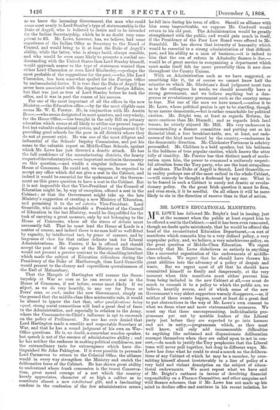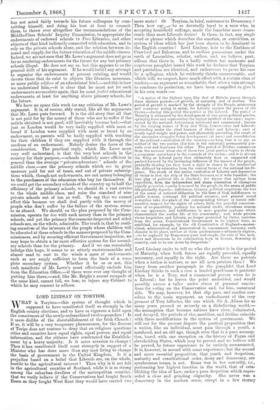MR. LOWE'S EDUCATIONAL MANIFESTO. A/ R. LOWE has followed Mr. Bright's
lead in issuing, just at the moment when the public at least expect him to. be offered a seatin the Cabinet,—and it has been even rumoured, though no doubt quite mistakenly, that he would be offered the head of the reconstituted Education Department,—a sort of manifesto which commits him to a very defined policy, a very unpopular policy, and, we believe, a very mischievous policy, on the great question of Middle-Class Education. We regret sincerely that Mr. Lowe disbelieves so entirely in anything like a successful organization of the endowments of middle- class schools. We regret that he should have thrown his- great abilities into the advocacy of a policy of despair and waste. But we regret most of all that he should have committed himself so finally and dangerously, at the very- moment when this manifesto must either prevent him from being included in the new Cabinet at all,—or must do- much to commit it to a policy to which the public are, we believe, heartily averse, and of which some of the new Government's very ablest supporters warmly disapprove,—or, if neither of these events happen, must at least do a great deal to put obstructions in the way of Mr. Lowe's own consent to- what we deem wiser and more statesmanlike measures. We- must say that these uncompromising, individualistic pro- grammes put out by notable leaders of the Liberal party just before they are expected to go into harness- and act in unity,—programmes which, as they must well know, will only add immeasurable difficulties to anything like unbiassed and dispassionate deliberation amongst themselves when they are called upon to act in con- cert,—do much to justify the Tory prophecies that the Liberal team will never pull together, but drag in different ways. Mr. Lowe has done what he could to steal a march on the delibera- tions of any Cabinet of which he may be a member, by com- mitting himself almost irretrievably to a line of policy of a very bold and violent description on the subject of educa- tional endowments. We must repeat what we have said of Mr. Bright's outburst in favour of devolving financial responsibility on a Finance Committee, and other sanguine and wild finance schemes, that if Mr. Lowe has not made up his
to decline office and continue in his recent isolation, he'
has not acted fairly towards his future colleagues by com- mitting himself, and doing his best at least to commit them, to throw over altogether the recommendations of the Middle-Class Schools' Inquiry Commission, to appropriate the endowments of endowed schools to Free Libraries, and other objects of that kind indirectly connected with education, and to rely on the private schools alone, and the relation between de- mand and supply, for the future education of the middle classes. Indeed, we are not sure that Mr. Lowe's argument does not go as far as rendering endowments for the future for any but primary schools illegal. He does not say so, but this appears to us the general drift of his argument. If he would forbid any attempt to organize the endowments at present existing, and would devote those that do exist to objects like libraries, museums, or mere public edifices of an educational kind,—and this is how we understand him,—it is clear that he must not let such endowments accumulate again, that he must forbid educational endowments, at least for anything above primary schools, for the future.
We have no space this week for any criticism of Mr. Lowe's argument. It is, of course, ably stated, like all the arguments that Mr. Lowe puts forward. It is the old story that all that is not paid for by the money of those who are to suffer if the article obtained is not good, will inevitably become bad,—that just as London would be very badly supplied with meat or bread if London were supplied with meat or bread by an endowment, so parents will be badly supplied with teaching for their children if they are supplied with it through the medium of an endowment. Nobody denies the force of the consideration. The practical reply, which Mr. Lowe must very well understand, is that the very best schools in the country for their purpose,—schools infinitely more efficient in general than the average "private-adventure" schools of the middle class,—are the primary schools which are in great measure paid for out of taxes, and out of private subscrip- tions which, though not endowments, are not money belonging to the purchasers of the education who buy for themselves. If we could get the secondary schools of the country up to half the efficiency of the primary schools, we should do a vast service to the whole middle class, and raise the standard of nine private schools out of ten as well. To say that we cannot effect this because we shall deal partly with the money of people who don't suffer by the failure of the system, seems to us absurd. We should, on the plan proposed by the Com- mission, operate far less with such money than in the primary schools, and yet the primary Government-inspected and aided schools are, on the whole, admirable. The truth is, that by avail- ing ourselves of the interests of the people whose children will be educated at these schools in the manner proposed by the Com- missioners, and by securing efficient Government inspection, we may hope to obtain a far more effective system for the second- ary schools than for the primary. And if we can reasonably indulge this hope, it seems to us utterly unstatesmanlike and almost mad to cast to the winds a mass of endowments such as are amply sufficient to form the basis of a com-
plete secondary system. Whether it be so or not, this rash manifesto of Mr. Lowe's must effectually exclude him from the Education Office,—if there were ever any thought of putting him there,—and, like Mr. Bright's recent escapade of the same kind, cannot fail, we fear, to injure any Cabinet to which he may consent to adhere.



































 Previous page
Previous page